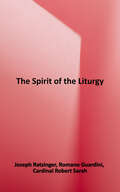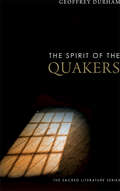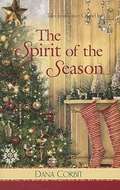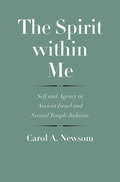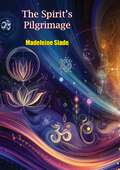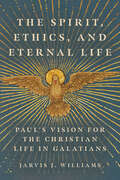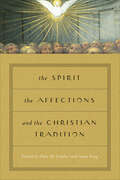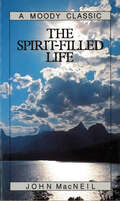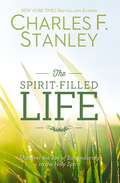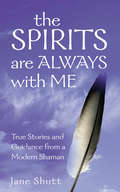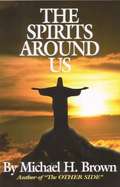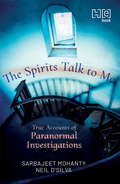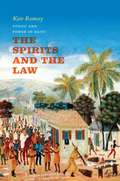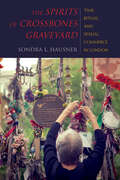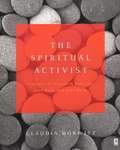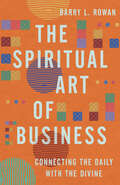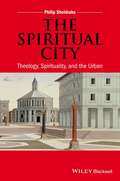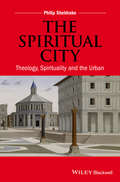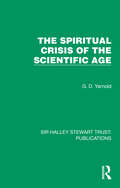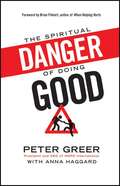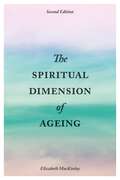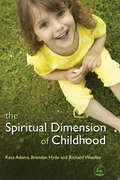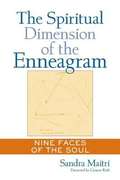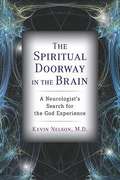- Table View
- List View
The Spirit of the Liturgy
by Joseph Ratzinger Romano GuardiniIn honor of its fortieth anniversary (1978-2018), Ignatius Press presents a special Commemorative Edition of one of the most important works written by Joseph Ratzinger, The Spirit of the Liturgy. <p><p>This edition includes the earlier classic work with the same title by Servant of God Romano Guardini, a book that helped Ratzinger to "rediscover the liturgy in all its beauty, hidden wealth and time-transcending grandeur, to see it as the animating center of the Church, the very center of Christian life"". Considered by Ratzinger devotees as one of his greatest works, this profound and beautifully written treatment of the liturgy will help readers to deepen their understanding of the "great prayer of the Church". The cardinal discusses fundamental misunderstandings of the Second Vatican Council's intentions for liturgical renewal, especially about the priest's orientation of prayer to the Father, the placement of the tabernacle in churches, and the posture of kneeling. <p><p.Other important topics are the essence of worship, the Jewish roots of Christian prayer, the relationship of the liturgy to time and space, sacred art and music, and the active participation of the faithful in the Mass.
The Spirit of the Quakers
by Geoffrey DurhamWho are the Quakers, what do they believe, and what do they practice? The Religious Society of Friends--also known as Quakers---believes that everyone can have a direct experience of God. Quakers express this in a unique form of worship that inspires them to work for change in themselves and in the world. InThe Spirit of the Quakers, Geoffrey Durham, himself a Friend, explains Quakerism through quotations from writings that cover 350 years, from the beginnings of the movement to the present day. Peace and equality are major themes in the book, but readers will also find thought-provoking passages on the importance of action for social change, the primacy of truth, the value of simplicity, the need for a sense of community, and much more. The quoted texts convey a powerful religious impulse, courage in the face of persecution, the warmth of human relationships, and dedicated perseverance in promoting just causes. The extended quotations have been carefully selected from well-known Quakers such as George Fox, William Penn, John Greenleaf Whittier, Elizabeth Fry and John Woolman, as well as many contemporary Friends. Together with Geoffrey Durham's enlightening and sympathetic introductions to the texts, the extracts from these writers form an engaging, often moving guide to this accessible and open-hearted religious faith.
The Spirit of the Season (Tales from Grace Chapel Inn #21)
by Dana CorbitOnce readers visit the charming village of Acorn Hill they'll never want to leave. Three sisters-Louise, a widow from Philadelphia; Alice, an unmarried nurse who lived with her father; and Jane, a divorced chef from San Francisco-reunite in the sleepy town after their father's death and turn the family home into a charming bed-and-breakfast. Here the sisters rekindle old memories, rediscover their childhood bonds, revel in the blessings of friendship and meet fascinating guests along the way. -------It's December and Acorn Hill is festive, but the Howard sisters are about to discover that Christmas doesn't always mean peace on earth. A misunderstanding between Florence Simpson and her husband Ronald has Florence jetting off to Florida-and feisty Ethel has just the solution. She sets off after her friend and drags Alice and Ronald with her, determined to convince Florence that her marriage is worth fighting for. Can she get through to the couple in time to make it back to Acorn Hill by Christmas? Meanwhile, the downtown merchants of Acorn Hill start a Secret Santa program, and Jane sees a special way to arrange a special Secret Santa delivery for a needy family in town. As Christmas gets closer, they all begin to get into the spirit of the season.
The Spirit within Me: Self and Agency in Ancient Israel and Second Temple Judaism (The Anchor Yale Bible Reference Library)
by Carol A. NewsomThe first full-length study of the evolution of self and agency in ancient Israelite anthropology Conceptions of &“the self&” have received significant recent attention in philosophy, anthropology, and cultural history. Scholars argue that the introspective self of the modern West is a distinctive phenomenon that cannot be projected back onto the cultures of antiquity. While acknowledging such difference is vital, it can lead to an inaccurate flattening of the ancient self. In this study, Carol A. Newsom explores the assumptions that govern ancient Israelite views of the self and its moral agency before the fall of Judah, as well as striking developments during the Second Temple period. She demonstrates how the collective trauma of the destruction of the Temple catalyzed changes in the experience of the self in Israelite literature, including first‑person-singular prayers, notions of self‑alienation, and emerging understandings of a defective heart and will. Examining novel forms of spirituality as well as sectarian texts, Newsom chronicles the evolving inward gaze in ancient Israelite literature, unveiling how introspection in Second Temple Judaism both parallels and differs from forms of introspective selfhood in Greco‑Roman cultures.
The Spirit's Pilgrimage
by Madeleine Slade“The Spirit's Pilgrimage by Madeleine Slade is a spiritual memoir that chronicles the author's journey from a privileged life in England to a life of service in India. Slade, who was known as Mirabehn, was a disciple of Mahatma Gandhi and played a significant role in India's struggle for independence. The book begins with Slade's childhood in England and her early years as a socialite. However, after reading Gandhi's autobiography, she felt a deep calling to serve the Indian people and left her comfortable life to join him in India. The Spirit's Pilgrimage details Slade's experiences living with Gandhi and his followers, as well as her involvement in the Indian independence movement. She writes about the challenges she faced as a foreigner in India and the sacrifices she made to serve the cause she believed in. Throughout the book, Slade reflects on her spiritual journey and the lessons she learned from Gandhi. She writes about her struggles with ego and attachment, and how she found peace and purpose through her service to others. Overall, The Spirit's Pilgrimage is a moving and inspiring memoir that offers a unique perspective on India's struggle for independence and the power of spiritual transformation.”-Print ed.
The Spirit, Ethics, and Eternal Life: Paul's Vision for the Christian Life in Galatians
by Jarvis J. WilliamsWhat should the Christian life look like? What vision does Scripture cast for living as a follower of Christ? The New Testament scholar Jarvis Williams considers how Paul's letter to the Galatians can inform our understanding of the Christian life here and now as well as into eternity. What emerges from this careful study is a multifaceted vision of God's saving action in Jesus Christ for both Jew and Gentile, in both the vertical relationship between God and humanity as well as the horizontal relationships among people—with cosmic ramifications. Through Paul's instructions and Williams's interpretation, Christians can learn the importance of walking by the Spirit.
The Spirit, the Affections, and the Christian Tradition
by Dale M. Coulter and Amos YongThe essays in this volume explore the role of emotions and affections in the Christian tradition, focusing also on the importance of pneumatology in Christianity.
The Spirit-Filled Life (Moody Classics)
by John MacNeil"...the Fullness of the Spirit is the Birthright of every believer." That fullness is not only a privilege; God's Word commands us to be filled with His Spirit. And to be filled, we must first be cleansed. Only the Spirit can complete that task in our lives, and He does that when we yield ourselves to God. Explore the means of being Spirit-filled, and the blessings that result from it.
The Spirit-Filled Life: Discover the Joy of Surrendering to the Holy Spirit
by Charles F. StanleyA wise, measured, and deeply passionate invitation to a Spirit-filled life Are you trying your best to be a good Christian but still feel something’s missing? Do the peace and joy you long for seem to elude you? Does following Christ sometimes feel like a lot of work—or like it’s just not working very well? Much has been written and spoken—and argued!—about the Holy Spirit and what it means to be filled with the Spirit. Charles Stanley cuts through the confusion and introduces you to a living Person as real and active as God the Father and Christ the Son. Through personal stories, biblical exploration, and insightful explanation, he will help you discover: who the Spirit is—and how to develop a relationship with Him who the Spirit isn’t—and how to avoid damaging misconceptions how being “filled” with the Spirit actually works what the Bible really teaches about spiritual “signs” such as speaking in tongues how the Spirit can increase your capacity for faith, hope, love, and personal transformation what it means to “hear” the Spirit’s voice how to make the most of your unique spiritual gifting to build up Christ’s body what happens when the Spirit’s power is unleashed in your workplace, your family life, your friendships, and every other area of your life In The Spirit-Filled Life Charles Stanley reveals how to recognize and begin to live with the guiding presence of the Holy Spirit.
The Spirits Are Always With Me: True Stories and Guidance From A Modern Shaman
by Jane ShuttJane Shutt is a down-to-earth Yorkshire woman who leads an extraordinary life as one of Britain's leading shamanic healers. Shamanism is an ancient spiritual path that exists all around the world; and a shaman uses his or her close affinity with nature and spirits to help those in need of healing. In The Spirits are Always with Me, Jane Shutt explains what shamanism really is, and how it is especially relevant to us in the modern world as we seek to connect with our roots and with our own sense of inner purpose. She shares her own incredible story and the stories of many of those who have come to her for help and healing. Jane reveals the ways in which shamanism can dramatically help people to turn their lives around. She recalls her own shamanic journeys to other levels of reality, including adventures in the Otherworld, spine-tingling visits to the Land of the Dead and other reaches of existence. She shows how shamanism can offer inroads into anything from curing a physical ailment, to dealing with mischievous household sprites, through to healing a whole city.
The Spirits Around Us
by Michael H. BrownSpirits, both good and evil, surround us as we go through life. We need to be aware of the angels, pray to them; avoid evil spirits. The book presents many near-death experiences.
The Spirits Talk to Me: True Accounts of Paranormal Investigations
by Sarbajeet Mohanty Neil D'Silva‘It’s something in your line of work,’ he said hurriedly. ‘It’s something…otherworldly. Please come.There is no time to lose.’A forest lures men to their doom, invisible hands smash crockery in a time-worn house, machines turn malevolent in an old factory, phantom laughter, whispers from nowhere, shadows that trail people – these are just some of the experiences that Sarbajeet Mohanty, paranormal investigator and founder of the Parapsychology and Investigations Research Society, confronts daily on the job.Tracking Sarbajeet and his team as they probe harrowing supernatural happenings across the country, these ten suspenseful tales move from a courthouse occupied by an insidious presence to a hellish riverbank where battles from the ancient Kalinga war continue to play out, to a film studio in Mumbai where a sordid past waits to be unearthed. Along the way, readers get a rare peek into the distinctive investigative methods used by the team to detect mysterious forces that exist in parallel realms. Narrated by veteran horror writer Neil D’Silva in atmospheric prose, the chilling accounts in The Spirits Talk to Me are spine-tingling and guaranteed to make you lose sleep.
The Spirits and the Law: Vodou and Power in Haiti
by Kate RamseyVodou has often served as a scapegoat for Haiti’s problems, from political upheavals to natural disasters. This tradition of scapegoating stretches back to the nation’s founding and forms part of a contest over the legitimacy of the religion, both beyond and within Haiti’s borders. The Spirits and the Law examines that vexed history, asking why, from 1835 to 1987, Haiti banned many popular ritual practices. To find out, Kate Ramsey begins with the Haitian Revolution and its aftermath. Fearful of an independent black nation inspiring similar revolts, the United States, France, and the rest of Europe ostracized Haiti. Successive Haitian governments, seeking to counter the image of Haiti as primitive as well as contain popular organization and leadership, outlawed “spells” and, later, “superstitious practices. ” While not often strictly enforced, these laws were at times the basis for attacks on Vodou by the Haitian state, the Catholic Church, and occupying U. S. forces. Beyond such offensives, Ramsey argues that in prohibiting practices considered essential for maintaining relations with the spirits, anti-Vodou laws reinforced the political marginalization, social stigmatization, and economic exploitation of the Haitian majority. At the same time, she examines the ways communities across Haiti evaded, subverted, redirected, and shaped enforcement of the laws. Analyzing the long genealogy of anti-Vodou rhetoric, Ramsey thoroughly dissects claims that the religion has impeded Haiti’s development.
The Spirits of Crossbones Graveyard: Time, Ritual, and Sexual Commerce in London (New Anthropologies of Europe)
by Sondra L. HausnerEvery month, a ragtag group of Londoners gather in the site known as Crossbones Graveyard to commemorate the souls of medieval prostitutes believed to be buried there—the "Winchester Geese," women who were under the protection of the Church but denied Christian burial. In the Borough of Southwark, not far from Shakespeare's Globe, is a pilgrimage site for self-identified misfits, nonconformists, and contemporary sex workers who leave memorials to the outcast dead. Ceremonies combining raucous humor and eclectic spirituality are led by a local playwright, John Constable, also known as John Crow. His interpretation of the history of the site has struck a chord with many who feel alienated in present-day London. Sondra L. Hausner offers a nuanced ethnography of Crossbones that tacks between past and present to look at the historical practices of sex work, the relation of the Church to these professions, and their representation in the present. She draws on anthropological approaches to ritual and time to understand the forms of spiritual healing conveyed by the Crossbones rites. She shows that ritual is a way of creating the present by mobilizing the stories of the past for contemporary purposes.
The Spiritual Activist: Practices to Transform Your life, your Work and Your World
by Claudia HorwitzPractical guide to individual and social transformation.
The Spiritual Art of Business: Connecting the Daily with the Divine
by Barry L. RowanWe want the thousands of hours we will work over our lifetime to matter. But how do we know they're really significant? How do we go from being defined by what we do to having our work become an expression of who we are? There is not a quick fix but a progressive solution: it begins with surrendering our whole lives and then every moment of our lives to God. In The Spiritual Art of Business, "corporate mystic" Barry Rowan invites us to be transformed by God that he might transform the world through us as we begin to see our work as an extension of our faith. He says, "We don't derive meaning from our work; we bring meaning to our work." Relating his extensive past in high-ranking executive roles, Rowan beckons us into a connection with God that will infuse our lives, our offices, and our world with meaning. With forty short chapters, this is not just a book to be read but instead is an invitation into an experience with God. Here's an opportunity to ponder new perspectives and see business as a chance to serve God by contributing to a better society.
The Spiritual Brain: A Neuroscientist's Case for the Existence of the Soul
by Denyse O'Leary Mario BeauregardDo religious experiences come from God, or are they merely the random firing of neurons in the brain? Drawing on his own research with Carmelite nuns, neuroscientist Mario Beauregard shows that genuine, life-changing spiritual events can be documented. He offers compelling evidence that religious experiences have a nonmaterial origin, making a convincing case for what many in scientific fields are loath to consider—that it is God who creates our spiritual experiences, not the brain. Beauregard and O'Leary explore recent attempts to locate a "God gene" in some of us and claims that our brains are "hardwired" for religion—even the strange case of one neuroscientist who allegedly invented an electromagnetic "God helmet" that could produce a mystical experience in anyone who wore it. The authors argue that these attempts are misguided and narrow-minded, because they reduce spiritual experiences to material phenomena. Many scientists ignore hard evidence that challenges their materialistic prejudice, clinging to the limited view that our experiences are explainable only by material causes, in the obstinate conviction that the physical world is the only reality. But scientific materialism is at a loss to explain irrefutable accounts of mind over matter, of intuition, willpower, and leaps of faith, of the "placebo effect" in medicine, of near-death experiences on the operating table, and of psychic premonitions of a loved one in crisis, to say nothing of the occasional sense of oneness with nature and mystical experiences in meditation or prayer. Traditional science explains away these and other occurrences as delusions or misunderstandings, but by exploring the latest neurological research on phenomena such as these, The Spiritual Brain gets to their real source.
The Spiritual City: Theology, Spirituality and the Urban
by Philip SheldrakeA Spiritual City provides a broad examination of the meaning and importance of cities from a Christian perspective. Contains thought-provoking theological and spiritual reflections on city-making by a leading scholar Unites contemporary thinking about urban space and built environments with the latest in urban theology Addresses the long-standing anti-urban bias of Christianity and its emphasis on inwardness and pilgrimage Presents an important religious perspective on the potential of cities to create a strong human community and sense of sacred space
The Spiritual City: Theology, Spirituality, and the Urban
by Philip SheldrakeA Spiritual City provides a broad examination of the meaning and importance of cities from a Christian perspective. Contains thought-provoking theological and spiritual reflections on city-making by a leading scholar Unites contemporary thinking about urban space and built environments with the latest in urban theology Addresses the long-standing anti-urban bias of Christianity and its emphasis on inwardness and pilgrimage Presents an important religious perspective on the potential of cities to create a strong human community and sense of sacred space
The Spiritual Crisis of the Scientific Age (Sir Halley Stewart Trust: Publications)
by G. D. YarnoldFirst published in 1959, the original blurb reads: “No good purpose is served today by treating the relationship between Christianity and the natural sciences as a conflict; even as a conflict to be resolved. The modern world is passing through a crisis of far-reaching proportions; which is the direct consequence of its inability to assimilate new scientific knowledge, and to direct rightly the new technical skills. The crisis, which is essentially spiritual in character, is examined in its three principal aspects. Accordingly, the first part of the book deals with our understanding of the order of nature; the second with some of the central doctrines of the Christian faith; and the final section with the pressing ethical and moral problems of the industrial and nuclear age.” Today it can be read and enjoyed in its historical context.This book is a re-issue originally published in 1959. The language used and views portrayed are a reflection of its era and no offence is meant by the Publishers to any reader by this re-publication.
The Spiritual Danger of Doing Good
by Brian Fikkert Peter Greer Anna HaggardInfluential social justice leader and President of HOPE International reveals how "doing good" can be spiritually disastrous--and how to prevent it from corroding our hearts.
The Spiritual Dimension of Ageing, Second Edition
by Elizabeth Mackinlay Dr Richard BurnsWhat does it mean to grow old? What makes later life meaningful? What gives a frail and isolated or institutionalised older person their sense of wholeness and self? This substantially updated new edition of Elizabeth MacKinlay's seminal text presents the latest theory and research to explore these questions in depth, pointing the way towards new ways of thinking about and engaging with the spirituality of ageing. Encompassing the findings of a new research study on baby boomer spirituality, the book presents a wider and more comprehensive view of ageing and spirituality, concluding that spirituality for the baby boomer generation is every bit as important as for the cohorts before them, but also fundamentally different, with fewer being practicing members of a religious faith. Drawing on in-depth interviews with older people, and containing many new ideas whilst also addressing the foundational theories and questions essential to scholarship in this field, the book also includes a new and timely chapter on the spirituality of older people in our increasingly multicultural and multifaith societies. This clear and practical text presents much-needed guidance for health and social care practitioners, chaplains, clergy and others seeking to identify and support the spiritual needs of older people, as well as students and researchers in related disciplines.
The Spiritual Dimension of Childhood
by Kate Adams Brendan Hyde Richard WoolleyThis book takes an in-depth look at spirituality and its continual expression in children, to support those working with children in developing their own perceptions and interaction with them. The authors outline exactly what is understood by contemporary spirituality, and discuss the importance of context in a consideration of spirituality. They explore key issues in understanding children's spirituality under three broad headings: children's voices - how they are often lost in the context of spirituality and what the implications of that loss are; children's worlds - how children draw on the spiritual as a means of addressing notions of meaning and value in life; and children's lives - how context shapes the spiritual dimension. Drawing on interdisciplinary perspectives, this accessible book will enrich the working practices of educators and other professionals who work with children, and will also be of interest to parents and anyone interested in children's spirituality.
The Spiritual Dimension of the Enneagram
by Sandra MaitriA groundbreaking exploration of the spiritual dimension of working with the enneagram by one of its earliest students and teachers in America.Here is one of the first books to explore in an authentic and comprehensive way the original spiritual dimension of the enneagram. Among the most knowledgeable teachers of the enneagram in America, Sandra Maitri shows how the enneagram not only reveals our personalities, but illuminates a basic essence within each of us. She shows how traversing the inner territory particular to our ennea-type can bring us profound fulfillment and meaning, as well as authentic spiritual development.
The Spiritual Doorway in the Brain
by Kevin Nelson"Bold, provocative, and highly readable. "-V. S. Ramachandran, M. D. , author of Phantoms in the Brain What are near-death experiences, out-of-body sensations, and spiritual ecstasy? And what do they have in common? Perhaps no one is more qualified to answer these questions than renowned neurobiologist Dr. Kevin Nelson. Drawing on his more than three decades of groundbreaking research into the "borderlands of consciousness," Dr. Nelson offers an unprecedented journey into the site of spiritual experience: the brain. Filled with amazing firsthand accounts as varied as a patient seeing the devil battling with his guardian angel to a man watching the universe synchronize around a pinball machine, The Spiritual Doorway in the Brain is an eloquent examination of our brains' spiritual "hardwiring" that will enthrall believers and skeptics alike. .
